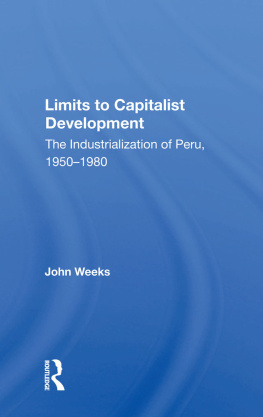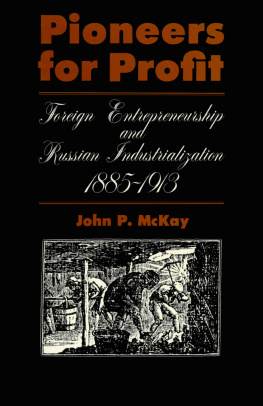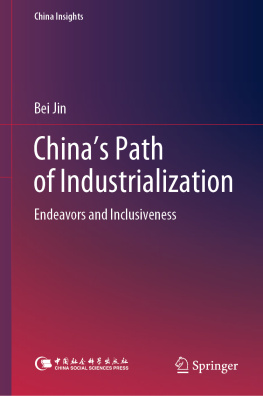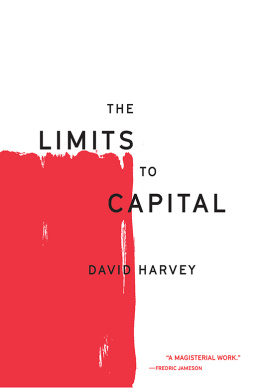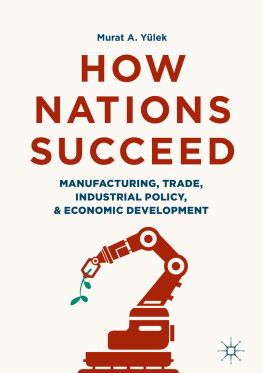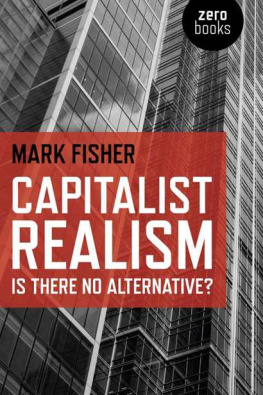Limits to Capitalist Development
Westview Replica Editions
The concept of Westview Replica Editions is a response to the continuing crisis in academic and informational publishing. Library budgets for books have been severely curtailed. Ever larger portions of general library budgets are being diverted from the purchase of books and used for data banks, computers, micromedia, and other methods of information retrieval. Interlibrary loan structures further reduce the edition sizes required to satisfy the needs of the scholarly community. Economic pressures on the university presses and the few private scholarly publishing companies have severely limited the capacity of the industry to properly serve the academic and research communities. As a result, many manuscripts dealing with important subjects, often representing the highest level of scholarship, are no longer economically viable publishing projectsor, if accepted for publication, are typically subject to lead times ranging from one to three years.
Westview Replica Editions are our practical solution to the problem. We accept a manuscript in camera-ready form, typed according to our specifications, and move it immediately into the production process. As always, the selection criteria include the importance of the subject, the work's contribution to scholarship, and its insight, originality of thought, and excellence of exposition. The responsibility for editing and proofreading lies with the author or sponsoring institution. We prepare chapter headings and display pages, file for copyright, and obtain Library of Congress Cataloging in Publication Data. A detailed manual contains simple instructions for preparing the final typescript, and our editorial staff is always available to answer questions.
The end result is a book printed on acid-free paper and bound in sturdy library-quality soft covers. We manufacture these books ourselves using equipment that does not require a lengthy make-ready process and that allows us to publish first editions of 300 to 600 copies and to reprint even smaller quantities as needed. Thus, we can produce Replica Editions quickly and can keep even very specialized books in print as long as there is a demand for them.
About the Book and Author
Dr. Weeks presents a detailed critique of dependency theory as an explanation of underdevelopment and offers an alternative theory based on the internal contradictions within underdeveloped countries and the competitive nature of international capitalism. Applying his theory to Peru, he shows how the country has been transformed over the last thirty years from a semifeudal society to a predominantly capitalist one, a process culminating in the military coup of 1968, which represented the seizure of power by the Peruvian industrialist class.
Using previously unavailable data, the author examines the evolution of the structure of production in Peru, the degree of monopoly and competition, wage determination and wage structure, ownership of capital, and the role of the state. He concludes that Peru was not "state capitalist" during the 1970s and assesses the failure of Peruvian capitalists to achieve greater independence from foreign capital.
Dr. John Weeks is professor of economics at the American University in Washington, D.C., and the author of Capital and Exploitation (1982) and The Economies of Central America (1984).
To Victo- Villanueva
Limits to Capitalist Development
The Industrialization of Peru, 1950-1980
John Weeks
First published 1985 by Westview Press, Inc.
Published 2018 by Routledge
52 Vanderbilt Avenue, New York, NY 10017
2 Park Square, Milton Park, Abingdon, Oxon OX14 4RN
Routledge is an imprint of the Taylor & Francis Group, an informa business
Copyright 1985 Taylor & Francis
All rights reserved. No part of this book may be reprinted or reproduced or utilised in any form or by any electronic, mechanical, or other means, now known or hereafter invented, including photocopying and recording, or in any information storage or retrieval system, without permission in writing from the publishers.
Notice:
Product or corporate names may be trademarks or registered trademarks, and are used only for identification and explanation without intent to infringe.
Library of Congress Cataloging in Publication Data
Weeks, John, 1941
Limits to capitalist development.
(A Westview replica edition)
1. Peru--Industries. 2. Saving and investment--Peru. I. Title.
HC227.W43 1985 338.0985 84-13233
ISBN 13: 978-0-367-01993-8 (hbk)
The purpose of this book is to analyze the process of industrialization in the context of underdevelopment. This task has both a theoretical and an empirical dimension and the two are strictly related. In any concrete situation, reality presents itself in a manner so complex that all aspects of it cannot be treated. The analysis is rarely limited by lack of data; rather, the problem is to select what data are most important. This selection process is determined by one's theory, and the theoretical framework of this book is explicitly Marxian or materialist. Anyone familiar with the Marxian literature on underdeveloped countries knows that this literature includes a wide variety of views, which frequently confront each other in open debate. Without duplicating what will follow, we can summarize the major positions as falling into two camps. On the one hand, there is "dependency theory" (though all dependency writers do not identify themselves as Marxists). In this analysis, the problem of underdevelopment is seen in terms of an international context, with the underdevelopment of a geographic area overwhelmingly determined by factors external to that area and imposed upon it. On the other hand, there is a growing school of Marxist thought which places emphasis upon internal factors. These two analytical positions are dealt with extensively in what follows.
This book is written from the second point of view, and it is appropriate that it should take Peru as the society for analysis. Almost all of the analysis of Peru, by Peruvians and non-Peruvians, is from a "dependency" vantage point, so we can confront dependency theory on what its adherents consider well-defended territory. We say "almost all", for in the 1970s, largely in response to the adoption of the dependency framework by the defenders of the "Peruvian Revolution", there emerged on the left a powerful critique of the dependency analysis of Peruvian underdevelopment. This author and his frequent colla-collaborator, Elizabeth Dore, were part of this revision of Peruvian economic and social history. The theoretical analysis which follows is indebted to the work of people formulating this new vision of Peruvian history.
The first two chapters of this book provide a critique of dependency theory, a necessary step towards elaborating an alternative analysis. , we present an alternative theory of underdevelopment, based on an analysis of the nature of capitalist development. This theory adheres closely to the analysis of Marx -- too closely some will protest. For want of a better term, the theory can be called "orthodox Marxism", a label any writer should accept willingly and we do. The central thesis of this theory is that the development of any society is determined by the nature of and change in the social relations of production -- the "class struggle", to use a shorthand term. By this we mean not just the struggle between exploiters and the exploited, but also among the exploiting classes. Central to this thesis is the view that capitalism is a progressive mode of production, characterized by social relations which make it by its nature dynamic. And it is this dynamism that brings forth the limits to capitalism's development.


